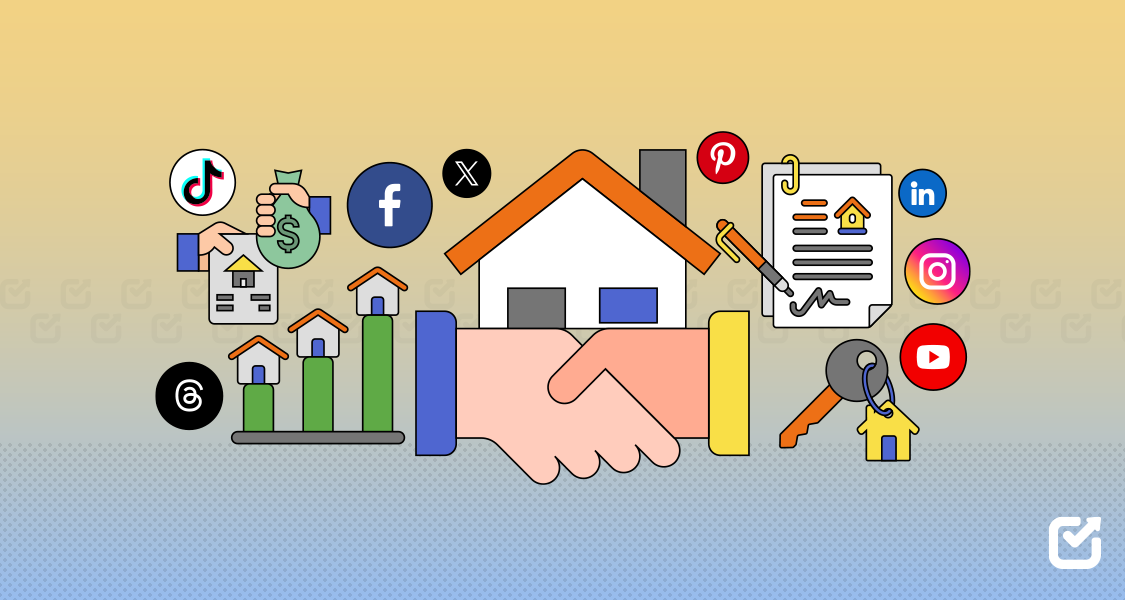Want to close more deals and grow a real estate business that feels personal?
It’s not just about knowing the market; it’s about connecting with people.
And today, most of those connections happen online. That’s where social media for real estate agents comes in.
Think about it—prospective buyers are scrolling, searching, and dreaming on social media.
Are you there to meet them?
Stunning property photos are a must, but managing social media goes beyond that.
It’s your chance to show your personality, share your expertise, and build trust with future homeowners.
In this blog, you’ll learn the top strategies to increase sales and build a strong online presence.
Let’s dive in!
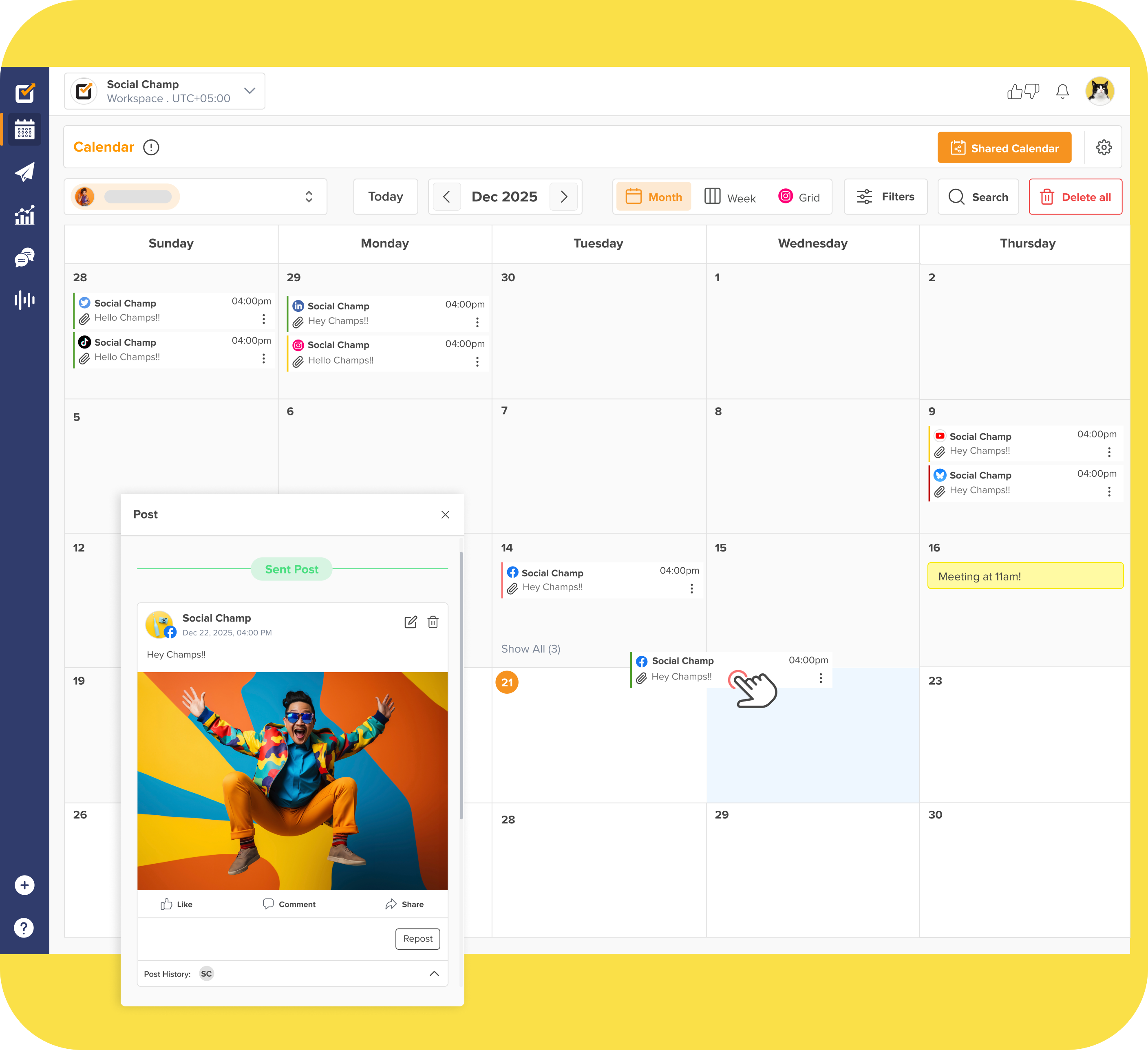
Automate Your Real Estate Social Media Today!
Keep your social media working 24/7 with Social Champ. Easily create, schedule, and publish posts all from one dashboard!
Short Summary
- Expand your reach by leveraging social media to connect with buyers, sellers, and industry professionals.
- Use Visual storytelling with platforms like Instagram to showcase stunning homes, videos, and virtual tours.
- Build trust and relationships by sharing testimonials, local insights, and your personal story to connect authentically.
- Engage actively by responding actively to comments, using live sessions, and collaborating with local influencers to foster engagement.
- Use automation & analytics tools like Social Champ to schedule posts and track performance for efficient social media management.
Why Social Media Is Essential for Real Estate Success
Why is social media so powerful in real estate?
It’s simple. Real estate is built on trust and relationships, and social media creates a bridge between you and your audience.
It transforms traditional, impersonal marketing methods into meaningful conversations, allowing you to connect directly with potential clients in a way that feels authentic and approachable.
Here’s why social media is a must-have tool for real estate agents today:
- Expand Your Reach: With billions of active users across platforms, social media allows you to tap into an audience far beyond your local market. Whether you’re focusing on first-time buyers or seasoned investors, the possibilities are virtually limitless.
- Real-Time Interactions: Platforms like Instagram and Facebook make instant communication easy. Answer questions, respond to comments, and connect with clients in real-time—this kind of engagement fosters trust and loyalty like nothing else can.
- Visual Storytelling: Real estate thrives on visuals, and social media is the perfect stage to showcase your properties. High-quality photos, videos, and virtual tours can transform a simple listing into a must-see experience, capturing the attention of potential buyers.
- Build Your Brand Identity: Social media marketing for real estate agents isn’t only about homes; it’s about YOU. Share market tips, client testimonials, and success stories to establish yourself as a go-to expert and build credibility within your community.
By leveraging these strategies, you can create a social media presence that does more than sell properties—it positions you as a trusted, relatable professional who understands the needs of your clients.
Featured Article: How to Use Facebook Audience Insights in 2025
Choosing the Right Platforms for Real Estate Marketing
When it comes to social media marketing for real estate agents, choosing the right platforms is just as important as the content you post.
Not all social media platforms are created equal, and different platforms appeal to different types of buyers and sellers.
-
Facebook: The All-Rounder
Facebook is one of the best platforms for real estate agents due to its massive user base and advanced targeting options.
With over 2.8 billion monthly active users, Facebook allows you to reach a wide audience, including potential buyers, sellers, and investors.
- Best For: Listing posts, client testimonials, engaging with local community groups, and running paid ads.
- Social Media Tips for Real Estate Agents: Join local groups and engage with your community. Also, use Facebook’s Marketplace feature to post property listings.
-
Instagram: Visual Storytelling
Instagram is the ultimate platform for showcasing stunning property photos and videos.
This visual-centric platform is ideal for real estate agents who want to highlight their properties in an engaging, visually appealing way.
- Best For: High-quality property images, behind-the-scenes content, virtual tours, and stories.
- Social Media Tips for Real Estate Agents: Use Instagram Stories to promote open houses and new listings. You can also utilize the Reels feature to post short videos of virtual tours, community highlights, or agent tips.
-
LinkedIn: Building Professional Connections
LinkedIn is a powerful tool for establishing a professional presence.
It’s not as visual as Instagram, but it’s incredibly effective for connecting with other industry professionals, such as mortgage brokers, contractors, or agents.
- Best For: Thought leadership, connecting with other professionals, sharing market insights, and building a network.
- Social Media Tips for Real Estate Agents: Share market trends, tips for buyers and sellers, and post thought leadership articles that can position you as an expert.
-
X (Twitter): Quick Updates and Networking
X (Twitter) might not be as widely used for real estate marketing as Facebook or Instagram, but it can still be an effective platform for connecting with local communities and staying on top of industry news.
- Best For: Sharing quick updates and news, and engaging in conversations related to real estate.
- Social Media Tips for Real Estate Agents: Follow local businesses and industry influencers to stay informed and engage in conversations about local real estate trends.
15 Winning Social Media Tips for Real Estate Agents
When it comes to achieving success in today’s competitive real estate market, social media for real estate agents is no longer optional—it’s essential.
A well-crafted strategy can help you connect with new clients, promote your listings, and solidify your brand.
Whether you’re just starting or looking to improve your online presence, these social media tips for real estate agents will help you build engagement, foster trust, and grow your business.
-
Choose the Best Social Media Platforms for Real Estate Agents
Not all social media platforms offer the same benefits, and it’s crucial to know where your efforts will have the most impact.
Start by focusing on Facebook, Instagram, and LinkedIn:
- Facebook: Ideal for building a local community and sharing detailed property information with groups and friends. Use Facebook Marketplace or real estate groups to post your listings and connect directly with buyers.
- Instagram: Perfect for visual storytelling. Post high-quality photos and short videos of your listings, and use Stories to provide followers with a behind-the-scenes glimpse of your process.
- LinkedIn: A professional networking hub where you can connect with other agents, local businesses, and potential clients. Post blogs or share market insights to establish yourself as an industry expert.
These platforms are considered some of the best social media platforms for real estate agents, helping you maximize your reach and engagement while aligning with your goals.
-
Optimize Your Social Media Profiles
A polished and professional profile can make a strong first impression. Here’s how to optimize yours:
- Profile Photo: Use a professional headshot that reflects your brand. Avoid casual selfies—your profile picture is your first point of contact.
- Bio: Craft a concise and engaging bio that highlights your expertise and personality. For example, “Helping families find their dream homes in [Your City]. Trusted real estate advisor with 10+ years of local market knowledge.”
- Links: Add links to your website, blog, or active property listings so potential clients can easily take the next step.
Clear, professional profiles are essential to effective social media management for real estate agents and give your audience confidence in your services.
-
Post High-Quality Visuals
Real estate is a highly visual industry, and your social media content should reflect that. Use these tips to ensure your visuals stand out:
- Photos: Invest in professional photography for your listings. Well-lit, high-resolution images can make a world of difference.
- Videos: Use video tours to walk potential buyers through homes virtually. Highlight key features and offer a peek at the surrounding neighborhood.
- Editing Tools: Apps like Canva or Lightroom can help you enhance your images by adding text overlays, branding, or filters.
High-quality visuals grab attention and keep followers engaged, making them a critical part of any successful social media marketing for real estate agents.
-
Leverage Live Videos and Q&A Sessions
Live video is one of the most effective ways to connect with your audience in a more personal and interactive way.
Here’s how real estate agents can use this feature:
- Live Q&A: Answer questions from buyers and sellers about the real estate process, current market trends, or specific neighborhoods.
- Virtual Open Houses: Walk viewers through a property in real time and respond to their questions instantly.
- Behind the Scenes: Showcase a day in your life as an agent, from preparing a listing to meeting with clients.
Live videos work wonders for building trust, as they allow your audience to see the authentic, human side of your business.
-
Use Hashtags Strategically
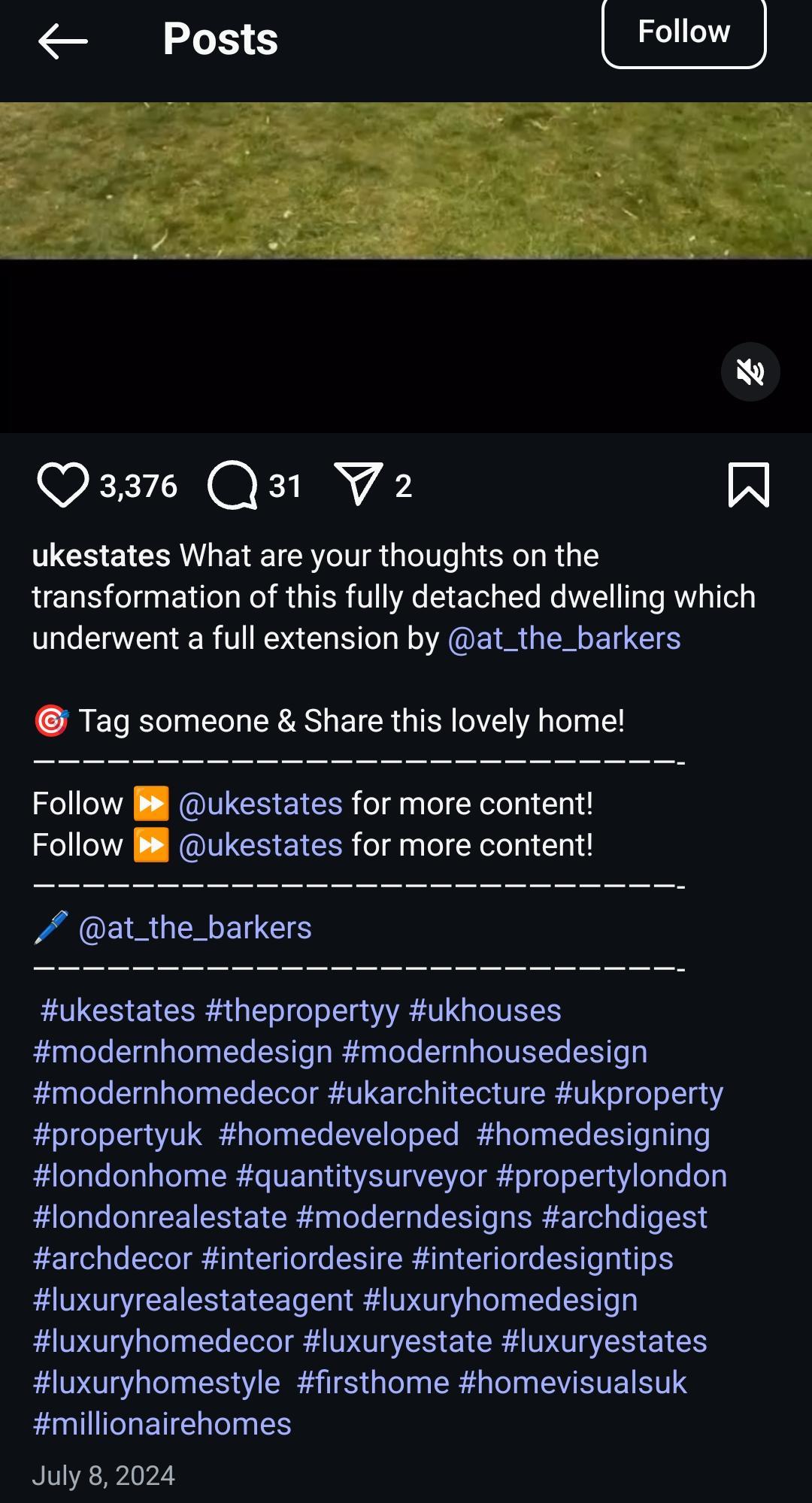
An Instagram Post With Relevant Hashtags Hashtags make it easier for people to find your content, especially local buyers and sellers.
Use a mix of generic and location-specific hashtags to maximize your reach:
- Generic Real Estate Hashtags: Examples include #DreamHome, #RealEstateExpert, and #LuxuryHomes.
- Location-Specific Hashtags: Add your city or neighborhood, like #MiamiRealEstate or #SeattleHomesForSale.
Tools like Hashtagify or Instagram’s Explore feature can help you identify the most effective hashtags for your audience.
When used properly, hashtags can enhance your social media and connect you with the right audience.
-
Consistently Engage With Your Audience
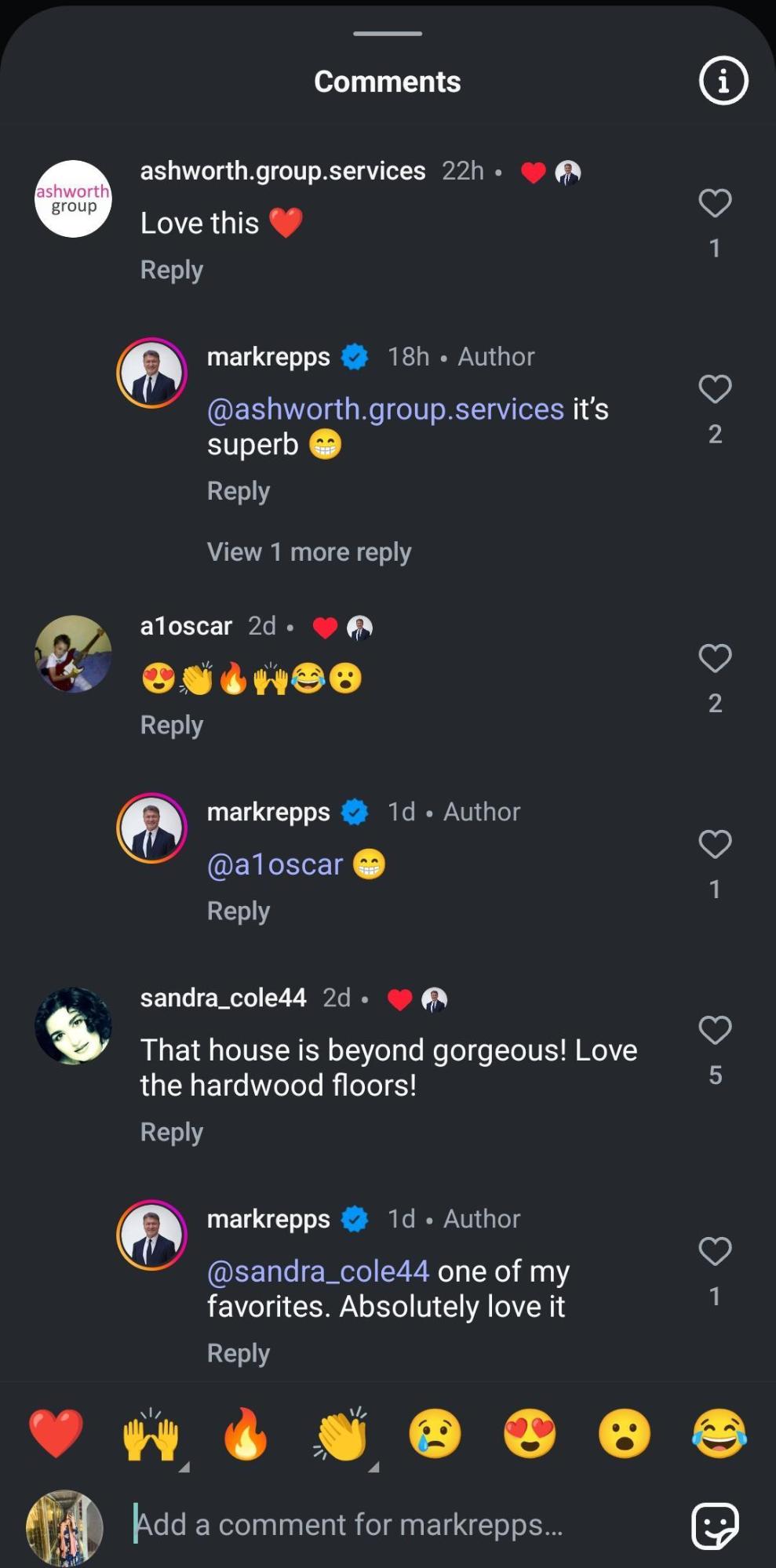
A Real Estate Agent Engaging With the Audience Social media isn’t just about posting; it’s about building relationships.
Make an effort to connect with your followers genuinely:
- Reply to comments on your posts.
- Respond promptly to direct messages.
- Like and comment on posts from local businesses, clients, and other agents.
Consistent interaction is key to mastering social media management for real estate agents and helps nurture trust with your audience.
-
Share Local and Community Content
One of the most effective strategies for social media for real estate agents is to position yourself as a neighborhood expert.
Buyers and even sellers value agents who know the ins and outs of the local community.
By sharing content highlighting your area, you can build trust and attract clients who appreciate your expertise.
Here’s how to do it effectively:
- Post Updates on Community Developments: Share information about new businesses, schools, parks, or residential developments. For instance, if a new coffee shop or daycare opens, post about it and highlight how it adds value to the neighborhood.
- Market Trends: Regularly post about housing market statistics or trends specific to your location. For example, report on rising property values or the average days homes are on the market in the area.
- Local Events: Get involved by sharing details about upcoming events like farmers’ markets, festivals, or charity runs. Better yet, attend these events and share live updates or photos.
- Neighborhood Highlights: Create posts that showcase the best features of an area, such as local schools, dining spots, or recreational activities. For example, “5 Reasons Families Love Living in [Neighborhood Name].”
By focusing on your local expertise, you’ll stand out on social media and create a genuine connection with your audience.
This method also works exceptionally well for social media marketing for real estate agents, as it positions you as a trusted community professional.
-
Post Testimonials and Success Stories

A Testimonial for a Real Estate Business Social proof is one of the most powerful tools in real estate.
When potential clients see how satisfied others are with your services, they’re more likely to trust you with their home-buying or selling needs.
Here are some ways to showcase testimonials and success stories for maximum impact:
- Before-and-After Stories: Share case studies of clients moving into their dream homes or successfully selling their properties. Provide some context by explaining the challenges they faced and how you helped overcome them.
- Video Reviews: Encourage happy clients to record short video testimonials. Videos feel more personal and authentic and tend to receive higher engagement on platforms like Instagram and Facebook.
- Written Testimonials: If you don’t have video testimonials, a glowing review can still work wonders. Pair quotes from satisfied clients with a professional photo or property image.
- Success Highlights: Share milestones such as “Sold X properties in 30 days” or “Helped [Number] families find homes this year.” Metrics-backed posts capture attention and amplify trust.
Sharing these insights on major platforms like LinkedIn, Instagram, and Facebook helps you establish credibility and attract new clients.
-
Schedule Posts With Management Tools
Consistency is the backbone of effective social media management for real estate agents.
But with a busy schedule, it can be challenging to post regularly.
This is where social media scheduling tools come in as lifesavers.
With tools like Social Champ, you can draft, schedule, and publish posts automatically.
Here’s how you can leverage them:
- Batch Content Creation: Set aside weekly time to create posts for your social media accounts. By planning, you ensure your profiles stay active even during busy months.
- Timing Your Posts: Research the best times to post on various platforms. For instance, Instagram engagement is often highest in the evenings, while LinkedIn performs well in the early morning. Most scheduling tools offer analytics to help you determine the best times for your audience.
- Multi-Platform Posting: Use scheduling tools to post simultaneously across multiple platforms, making your social media management more efficient.
By staying consistent with these tools, you’ll stay top-of-mind with your audience and optimize your social media strategy.
-
Offer Educational Content
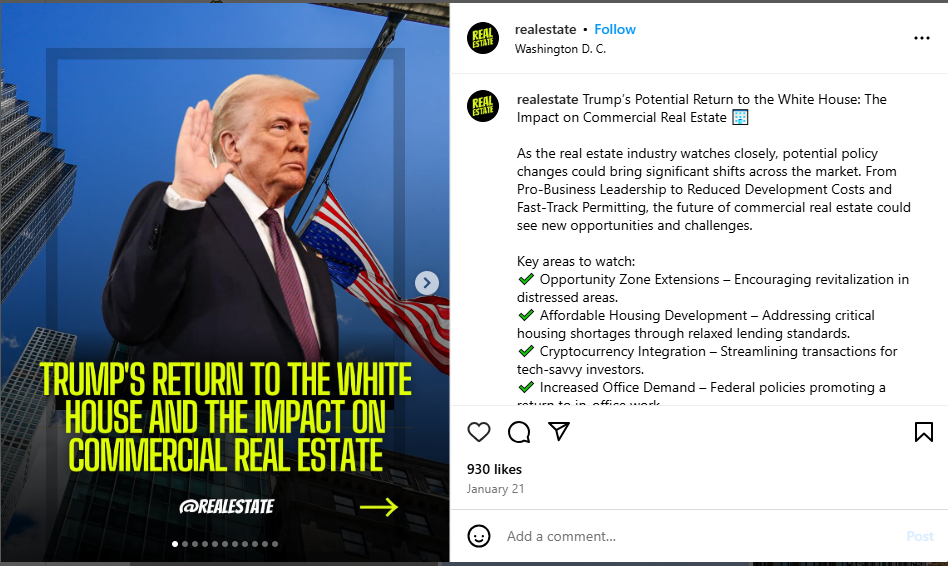
Real Estate News Post on Instagram To build credibility and engage your audience, share content that educates and empowers.
Potential buyers and sellers want to work with agents who are knowledgeable and willing to share their expertise.
Here are some ideas for valuable posts:
- How-To Guides: Create posts like “10 Steps to Buying Your First Home” or “How to Prepare Your Home for a Quick Sale.”
- Market Insights: Share advice on current real estate trends, mortgage rates, or financing tips. For instance, “Why Now is a Great Time to Buy in [Your City].”
- DIY Tips: Provide practical tips, such as easy home staging hacks or budget-friendly upgrades to boost property value.
- Infographics: Use tools like Canva to turn complex data into digestible graphics, such as housing market overviews or the home-buying process.
Educational content resonates with an audience and proves your value as a resource.
Incorporating this into your posts aligns perfectly with essential social media management strategies for real estate agents.
-
Invest in Targeted Ads
Pay-per-click advertising is an extremely effective tool in social media marketing for real estate agents, allowing you to target specific demographics and put your listings in front of the right people.
Platforms like Facebook and Instagram offer advanced options to create hyper-targeted campaigns.
Here are some ways to make ads work for you:
- Geo-Targeting: Narrow your audience to people within specific neighborhoods or cities. This is especially effective for promoting open houses or new listings.
- Demographic Filtering: Focus on specific age groups, income brackets, or family sizes. For instance, target higher-income consumers if you’re promoting a luxury home.
- Custom Audiences: Use your existing contact list to target past clients or warm leads who might still be interested in your services.
- Ad Formats: Experiment with carousel ads to showcase multiple properties in one post, or use video ads for virtual tours.
Targeted ads can significantly amplify your outreach, driving stronger results from your social media strategy.
-
Use Instagram Stories and Highlights
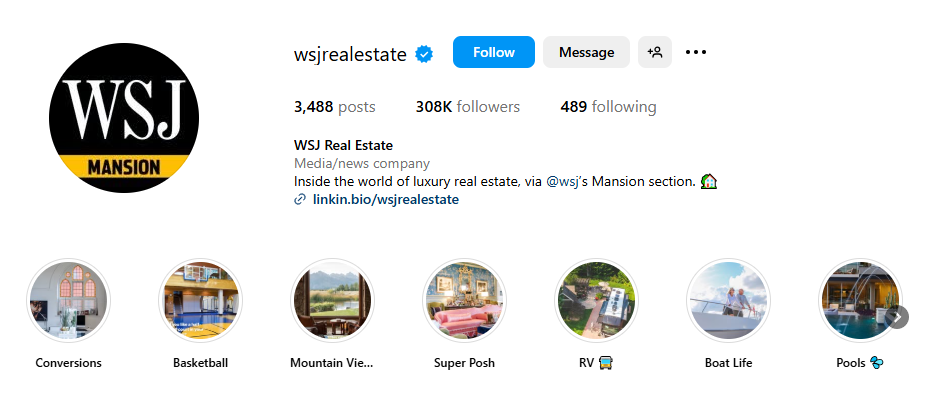
Instagram Highlights of a Real Estate’s Account Instagram Stories are a gold mine for immediate, engaging content that connects with your audience.
They allow you to showcase your personality while keeping followers updated on your latest listings and activities.
Here’s how you can use Instagram Stories effectively:
- Story Ideas: Share neighborhood tours, highlight amenities, or tease new listings with quick home walkthroughs. You can also post polls or quizzes to keep your audience engaged.
- Behind-the-Scenes: Give your audience a sneak peek into your day-to-day life as a real estate agent. Share moments like prepping for an open house or staging a home.
- Stories to Highlights: Save your best content by creating Highlights on your profile. Categorize them by topics such as “Sold Homes,” “Client Testimonials,” or “Market Tips.”
-
Collaborate With Local Influencers
Collaborating with local influencers is a powerful way to amplify your reach and establish yourself as a prominent figure in the community.
Influencers have a loyal following that trusts their opinions, making them valuable partners.
Here’s how to make the most of these partnerships:
- Identify Relevant Influencers: Look for active influencers who resonate with your target market. For example, a local lifestyle blogger, home decor enthusiast, or food critic could help you reach potential buyers or sellers interested in the community.
- Joint Promotions: Partner with influencers for joint promos, such as giveaways. For instance, you could offer a free home consultation or a gift card to a local store as part of a social media contest.
- Co-Created Content: Have influencers tour one of your listings, highlight its unique features, and share their experience with followers. This can be especially effective on platforms like Instagram.
- Feature Local Businesses: Collaborate with popular businesses like coffee shops, gyms, or restaurants for mutual publicity. For example, create a post showcasing a house near a well-loved café and tag them for a boost in visibility.
By leveraging local influencers, you can authentically expand your audience while enriching your efforts for real estate.
-
Monitor and Adjust Your Strategy
Social media isn’t a one-size-fits-all approach, so tracking your performance is essential for success.
Analyzing metrics gives you insights into what’s working and what’s not and how to fine-tune your strategy to resonate more effectively with your audience.
Here’s how to stay on top of your analytics:
- Track Key Metrics: Use platform-specific tools like Instagram Insights, Facebook Analytics, or third-party apps like Social Champ to keep an eye on engagement rates, follower growth, post reach, and click-through rates.
- Evaluate Popular Content: Identify which posts perform the best. Do your audience members love market trends, property tours, or client testimonials? Use this information as a guide for creating future content.
- A/B Testing: Test content variations, such as different captions, visuals, or posting times. For example, try posting a photo carousel of a listing versus a video tour to see which format engages your audience more.
By regularly evaluating your efforts, you can make data-driven decisions that enhance your social media approach and lead to better results over time.
-
Always Stay Authentic
Authenticity is the foundation of meaningful engagement.
People don’t just want to see polished listings; they want to connect with the person behind the brand.
By staying real and relatable, you can build trust and loyalty among your audience.
Here’s how to infuse authenticity into your social media for real estate agents strategy:
- Tell Your Story: Share your experience as a real estate agent—why you started, what you love about the industry, and lessons you’ve learned. A heartfelt post about a memorable client success story, for instance, can deeply resonate with your audience.
- Be Transparent: Honesty is key, whether you’re discussing market trends or sharing a behind-the-scenes glimpse of your work. For instance, if a property needs updates, mention them while framing opportunities for improvement.
- Showcase Your Personality: Don’t be afraid to share lighthearted, fun content that reflects who you are. Posting a photo of your favorite coffee spot or a video of your team brainstorming can humanize your brand and keep followers engaged.
By staying true to yourself and showing vulnerability, you can create a strong emotional connection with your followers.

Be the Real Estate Pro Everyone Talks About!
Automate posts, analyze results, and create a seamless social media presence with Social Champ. Get onboard now to make managing your brand a breeze!
Featured Article: 20+ Cool Instagram Story Ideas to Revamp Post Engagement in 2025
Simplify Your Workflow With Social Champ

If you’re struggling to keep up with your social media tasks, Social Champ is here to make your life easier.
This tool helps real estate agents automate their social media posts across multiple platforms, so you don’t have to worry about scheduling each post manually.
Key Features
- Automate Content Scheduling: Schedule posts for the entire week or month, and Social Champ will handle the rest. This means you can focus on selling homes and let the platform handle your social media presence.
- Monitor Performance With Advanced Analytics: Social Champ gives you detailed insights into how your posts are performing. Track engagement, views, clicks, and more so you can refine your strategy and boost results.
- Organize With a Content Calendar: Organize all your social content in a visual calendar tailored for easy planning and quick adjustments. Stay ahead with scheduled campaigns for holidays, promotions, or new listings.
- Stay Connected Through Engagement Tools: Respond to comments, messages, and mentions from all social platforms in one unified dashboard. Deliver timely responses to prospects and clients, boosting your reputation and responsiveness.
- Boost Efficiency With Team Collaboration: Invite team members to contribute, schedule, and manage content while keeping roles and permissions clear. Coordinate efforts with agents, assistants, or your marketing team seamlessly and professionally.
- Listen to What Matters With Social Listening: Monitor keywords, hashtags, and industry discussions to stay on top of real estate trends and client interests. Join conversations early and tailor your messaging to match what your audience cares about most.
- Stay Ahead With Competitor Analysis: Track and compare your competitors’ social media performance to see what’s working in your market. Use those insights to refine your strategy and stand out as a top-performing real estate agent.

Sell More Homes Without Posting Every Day!
Schedule listings, track performance, and stay active on every platform — all with Social Champ. Don’t let your competitors outshine you online!
Avoid These Social Media Mistakes in Real Estate
While social media can be an incredible tool, it’s important to avoid certain pitfalls.
Here are some mistakes real estate agents often make on social media:
- Inconsistent Posting: Posting sporadically won’t get you the results you want. Stay consistent with your content and posting schedule to keep your audience engaged and aware of your brand.
- Ignoring Analytics: Not tracking your performance is one of the biggest mistakes you can make. Analytics provide valuable insights into what’s working and what’s not. Use tools like Social Champ or native analytics on platforms like Facebook and Instagram to measure engagement, clicks, and conversions.
- Over-Promoting Listings: While it’s essential to showcase properties, overloading your followers with constant listing promotions can turn them off. Mix up your content with valuable information, personal stories, and community-focused posts to keep your audience engaged without feeling like they’re being sold to.
- Not Engaging with Followers: Social media is all about conversation. If you’re not engaging with your followers by responding to comments, liking their posts, and asking questions, you’re missing out on creating meaningful relationships.
- Lack of Visual Appeal: Real estate is a highly visual industry. If your posts don’t feature high-quality images or videos, you’re not taking full advantage of the platform’s potential. Always post clear, visually appealing photos of the properties you’re selling, as well as lifestyle shots that give potential buyers a sense of what it would be like to live in those homes.
Conclusion
Mastering social media for real estate agents isn’t just about creating posts—it’s about building connections, telling stories, and positioning yourself as an expert in the industry.
By choosing the right platforms, following social media tips, and using tools like Social Champ to streamline your workflow, you can significantly boost your engagement and sales.
Avoid common mistakes, stay consistent, and always focus on providing value to your audience.
As social media continues to evolve, staying on top of trends and adjusting your strategies will ensure that you’re always one step ahead of the competition.
By creating an engaging online presence, you’ll not only attract more clients but also build long-lasting relationships with your audience.
